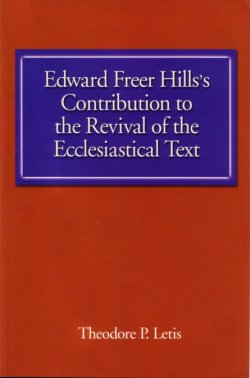Foreword
[to “Edward Freer Hills’s Contribution to the Revival of the Ecclesiastical Text”]

The
following research is the sine qua non
for understanding both the history of New Testament Text criticism as well as
the history of the modern Bible translation movement, within the North American
context. Mr. Peter J. Thuesen’s rather recent and important work, In Discordance with the Scripture: American
Protestant Battles over Translating the Bible (New York: Oxford University
Press, 1999) is also one chapter in this history, but is seriously selective in
both how it treats its themes and in which themes it has chosen to address. In
short, having been produced under the watching eye of Professor Bruce Metzger
(he was, in fact, responsible for the manuscript having been accepted by his
own publisher, Oxford University Press), one can safely state that this is the
“official” history of the subject from within the present establishment. And
just what establishment is that? Professor Metzger is the former chairman of
the Revised Standard Version, which
version, it should be stressed, is throughout the book a formal subject around
which all of the sub-themes revolve. So in a very real sense, this is a history
as told from the perspective of the advocates of the RSV, rather than from the
perspective of its critics.
My
assessment of this is not meant to suggest that the work displays an overt
bias; it does not. Perhaps it is safer to say it suffers from over selectivity.
For example, when treating Princeton Seminary’s adjustment to the new
discipline of New Testament text criticism which led to the now standard
evangelical posture of no longer defending the veracity of the extant Greek and
Hebrew manuscripts, but only the theoretical autographic form of these texts, no
mention whatsoever was made of my own research on this theme (cf. Theodore P. Letis, “B.B. Warfield,
Common-Sense Philosophy and Biblical Criticism,” Journal of the Presbyterian Historical Society (American Presbyterians)
69:3 [Fall 1991]: 175-190), though it has been recognized in such high profile
publications as Donald G. Bloesch’s Holy
Scripture: Revelation, Inspiration and Interpretation (Wheaton: Crossway,
1994), p. 307, n. 18; David B. Calhoun’s massive two volume history of
Princeton Seminary, Princeton Seminary 2
vols. (Edinburgh: The Banner of Truth, 1996), vol. 2, p. 469, n. 2; and in
Harriet A. Harris, Fundamentalism and
Evangelicalism (Oxford: Oxford Univ. Press, 1998), pp. 135 n. 3; 141 n.11.
Moreover, my supervisor for this master’s thesis, E. Brooks Holifield, from
whence the above essay by me treating Warfield was extracted, was also a reader
of Thuesen’s manuscript prior to publication, and so the idea that Mr. Thuesen
would not have been alerted to my own research on Warfield is unlikely in the
extreme (see his “acknowledgment” page). Hence, Thuesen’s research is
incomplete and, unfortunately, incorrect on some points for which he could have
gained help had he included my research on this subject (see his, pp. 44; 58;
174, n. 65 for examples of incomplete or incorrect interpretations).
Nevertheless,
we are very happy for other judgments on his part, such as “though advertised
as a more contemporary translation than the RSV, the NIV was in fact closest in
style to its liberal cousin [the RSV]. The NIV…’came into being as the result
of a repudiation of the RSV by the majority of conservative Protestants in this
country, and now that it has appeared it closely resembles the RSV’” (p. 151).
Nevertheless, for those who would
have the entire picture, what follows should be of great help in understanding
these subjects in a more comprehensive and illuminating way.
This is not to be considered a
published form of this work. Rather, I have granted Pensacola Christian College
sole rights to reproduce this manuscript in its present form for the benefit of
its student body and broader constituency. They alone, of all independent
Baptist institutions, have earned the right to take the lead on this important
topic of modern Bible translations within fundamentalist ranks because of their evident dedication to
genuine scholarship and integrity in an area where fundamentalists have many
time stumbled, both to the left, as well as on the right.
Theodore P. Letis, Ph.D.
Director
The Institute for
Renaissance and Reformation
Biblical Studies